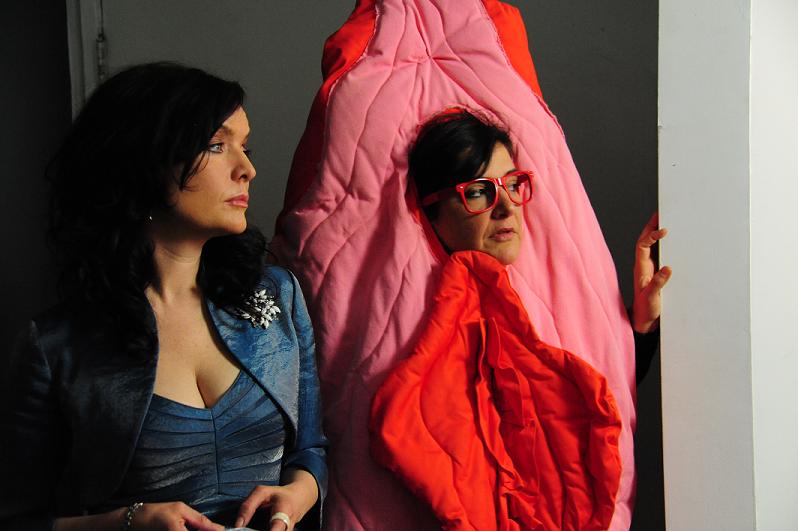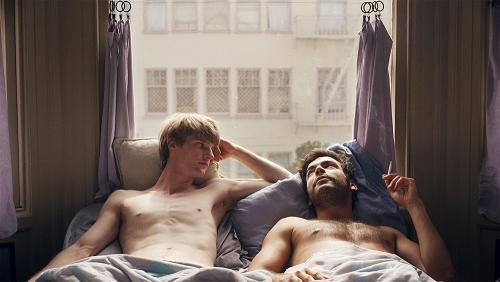
It's that time of year again -- or what used to be that time of year. NewFest is here (September 6-11). Yes, the celebration of gay, lesbian, bisexual, transgender, and what-have-you cinema is back for its 25th anniversary. The main venue will be the Film Society of Lincoln Center's Walter Reade Theater, considered by some to be the best cinema in Manhattan, one that boasts a truly superior sound system.
(Anyone who ever attended NewFest when it was held at the New School with its second-rate visuals and third-rate resonance will rejoice.)
In the past, this deliciously raucous event has screened a mixed bag of semi-brilliant to much-less-so offerings, many you'll never ever get to see anywhere else on a "big" screen whether you reside in the Big Apple or in Idaho. On the plus side, watching a woefully dreadful movie with a roomful of knowing GLBTQ cinephiles is often a hoot. Yes, there is an artistic masterpiece now and then, but more often you'll be proffered a little indie film that addresses aspects of your life that a heteronormative Hollywood would never consider dealing with. These offerings can be life-changing experiences.
And if you don't have a catharsis, you'll at least have something to chat about. Take Travis Matthew and James Franco's highly anticipated Interior. Leather Bar. This little "documentary film-within-a-film" dares to reveal the 40 minutes that were cut out of William Friedkin's 1980 exploitative take on the leather scene, Cruising, that starred Al Pacino.
Of what I viewed so far of the lineup of 15 narrative features, 4 documentaries, and 31 shorts, NewFest gleefully continues its approach of booking intriguing films of an oscillating quality.
1) Who's Afraid of Vagina Woolf?
This title, produced by Burning Bra Productions, might get an audience into the theater, but it won't stop them from hotfooting it out of there. If Edward Albee weren't still alive, he'd already be spinning in his coffin like Sonja Henie on speed.
Autobiographically inspired, this solipsistic tale is helmed by the hefty, Cuban-American Anna Margarita Albelo. She also stars as Anna, a hefty, down-and-out, Cuban-American director who lives in a friend's L.A. garage.
Mom: "You're not fat. Your father is Cuban. That's how Cubans are."
We first meet this very single, very depressed, slightly alcoholic, highly grating femme fatale dressed up as a giant vagina. Why? She's celebrating her 40th birthday poolside with some gal pals who're trying to fix her up, but to no avail.
Days later at an art gallery, once again attired in her external-genitalia garb, Anna dances for a seemingly appreciative crowd. Afterwards, she screens a short of her own, about a mime marooned on a beach, that apparently depicts Anna's own inner angst. More applause. This positive reaction doesn't undo the dejection Anna feels about the path her life is taking. Our part-time performance artist/part-time hawker of Brazilian waxes mopes in the gallery's john, where she meets a strikingly attractive and wooden Katia (portrayed by the strikingly attractive but wooden Janina Gavankar), who professes in academic gobbledygook that she's a fan. Wow! How will Anna get into her pants and into her heart?
Why not direct an all-lesbian version of Who's Afraid of Virginia Woolf? featuring Katia as the Hunk (the George Segal role) and Anna in the Richard Burton part? Let me count the reasons why.
Well, midway through Vagina, Jean Luc Godard is quoted as stating, "Shit on the audience as much as possible." Albelo, along with her screenwriter Michael Urban, have apparently taken Jean Luc too much to heart.
In fact, the only saving grace in this amazingly witless production is the charismatic Agnes Olech, who plays Julia, a lovely cinematographer who inconceivably falls for Anna. Being the only one on the set who could act must have been an exceedingly trying experience for this young star-in-the-making.
2) Geography Club
Based upon a popular YA novel by Scott Hartinger, this affable venture chronicles the difficulties of coming out in high school. Closeted Russel Middlebrook (Cameron Deane Stewart) falls for Kevin (Justin Deeley), a closeted football player. When the duo finally kiss, they are spotted by a member of the Geography Club, which is really a secretive safe space for GLBTQ kids. From this point on, Russel slowly moves on to embracing his sexuality while Kevin burrows further into secrecy: "I don't want to be gay. I want to play football.... I want to be normal." Imagine Glee without the music and with a cast in their mid-twenties. (Alex Newell (Wade 'Unique' Adams) even has a supporting role.) While a perfect consciousness-raiser for those 16 and under, for those of you who've already started shaving regularly this might be more of a wobbly entertainment.
3) Pit Stop
Yen Tan's solid adult drama explores what it is to be gay, rugged, and in your mid-thirties in the small Texas town of Dodge. First there's Gabe (Bill Heck), who can't leave his ex-wife and daughter behind for the big city. He almost tried, but before he could pack, he was dropped by his married ex-lover, who'll no longer take his phone calls. Then there's Hispanic Ernesto (Marcus DeAnda) who's about to kick his cheating, younger ex out of his apartment. So here are two hirsute hunks, who aren't aware of each other yet, but who can sate each other's emotional hunger if they do ever connect. So how will they meet before Pit Stop ends? Emotionally raw, unrelentingly honest, and dramatically feasible, here's a terrifically acted romp that deserves a lengthy art house run.
 4) Test
4) Test
Any gay male who was sexually active in the 1980s recalls how frightening it was to take one's first AIDS test. With friends dropping like flies or being disfigured by purple spots, it was hard back then to imagine anyone of the homosexual persuasion was free from the virus. I recall slowly ripping open the envelope and viewing my results: NEGATIVE. I couldn't believe God had bypassed me, at least for the moment.
Chris Mason Johnson's Test perfectly recreates the terror of 1985 with San Francisco as its locale. Frankie (Scott Marlowe), an understudy for a dance company where many of the male members are fucking like bunnies on their free time, is a bit nervous about the goings-on in his community. He has trouble reading about Rock Hudson's death in the newspaper or listening to hourly news reports about the epidemic. Walking down the street with his Walkman on, he passes a mattress that has been spray-painted "AIDS FAGGOT DIE." Meanwhile, female dancers in the troop are getting worried that the virus can be spread by sweat or by gay food handlers. Is finding love in such an atmosphere even a valid pursuit?
While Test sidesteps perfection in several minor areas, it more than makes up for those weaknesses with the magnetic performance by Matthew Risch as a promiscuous fellow hoofer; the authenticity of the screenplay; and the choreography by Sidra Bell.
5) Last Summer
One of the finest directorial debuts of recent years is Mark Thiedeman's. Here a young helmer paints the screen with complex textures and sound, perfectly capturing the joys and throes of teens in love in a very small Arkansas town.
Luke and Jonah have been friends since they were tots, and when they eventually became intimate, no one seemed to actually care. So why is this their last summer? Their academic qualifications are surprisingly the demons working to separate the duo. Jonah, "who sucks at sports," can watercolor and play Schumann on the piano. His bookshelves house Emily Dickinson, Flannery O'Connor, and The Picture of Dorian Gray. Meanwhile, Luke is in summer school trying to pass math. Yes, in a week or so, the preternaturally gifted Jonah is going to an out-of-town college. Luke sees his own solo future as one of stagnation. He'll remain behind, trying to make something out of the nothing that satisfies his kinfolks and neighbors. But it doesn't have to be that way, does it? Jonah even wants Luke to ask him to stay, knowing he won't.
There is barely a plot here, but Thiedeman doesn't need one, nor does he need many words to tell his tale. With the aid of the exceptional camera work by David Goodman, he focuses on entangled feet, clasped hands, a distant cow, lips going down on a hamburger, dirty fingernails, a carburetor, a sweaty brow, blades of grass. Here flesh becomes a boundary-less landscape.
So much so that when Luke shares, "The truth is I idolize [Jonah]. I think he's perfect. I would give up everything for him," we've already seen that unfettered affection time and time again. Imagine the passion of Cocteau for Jean Marais as filtered through the eyes of a Capote and you've almost captured Thiedeman's grand vision.
